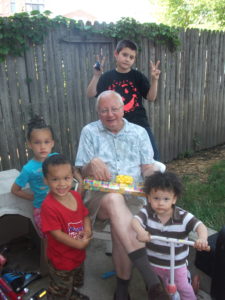Disability was one noteworthy theme during the presentations Monday night at the Democratic National Convention—how we perceive it, how we react to it, how we treat those with serious physical and mental limitations. It is no small subject, and Republican presidential nominee Donald Trump did himself no favors earlier in the year with his mocking imitation of a New York Times reporter, which the Democrats have already been using in ads to question his character. And rightly, for it does make you wonder what prompted such an immature outburst.
But I am not writing to dwell on the missteps of Trump, nor on the virtues of Hillary Clinton in this regard as extolled by speakers with disabilities on the stage in Philadelphia. That comparison is one of many people can decide for themselves. I am about to suggest a simple way of thinking about the issue that all of us can readily use even if we are not among the estimated 56 million Americans afflicted with such shortcomings.
It may be apparent to some that this blog suffered a short hiatus on my part since my last post. To some extent, that was because I found myself very busy chasing deadlines after my return from the Natural Hazards Workshop in Colorado on July 14, a day later than anticipated because of a flight cancellation due to storms in Chicago. I was then squeezed for time, with just six work days left until taking a vacation this week, with two of those largely devoted to participating in a U.S. Environmental Protection Agency symposium on urban sustainability. Nonetheless, by last Friday, I managed with some extra effort to clear the most urgent action items from my desk in preparation for a week off.
Then it hit. Maybe I was more vulnerable because of the time pressures, or maybe it was just something that caught up with me. There is no way to know, but my neck grew tight, and by the time I got home, fever and chills set in and my wife insisted on taking me to the emergency room. After three hours of tests and x-rays, strep and tonsillitis and similar problems were ruled out, but it was clear my right-side lymph nodes were inflamed and some sort of infection had taken residence inside my throat. The doctor gave me antibiotics, which I am taking for ten days, and they seem to be effective. But the illness certainly ruined an evening in which I was going to get a haircut and shop for groceries for an outdoor barbecue party in our backyard for my wife’s birthday on Sunday. I was pretty useless on Saturday, worn down and unable to swallow or talk without considerable effort, although I did help shop for groceries, including a birthday cake. I was not good for much more, and I was growing hungry because eating was such a chore.
That remained the case for much of Sunday, though I was energetic enough by then to join the party. I did not have nearly enough energy to play grillmaster in the hot sun, so someone else took over who enjoyed the job, fortunately. But all I could eat and swallow was watermelon and some cake and ice cream, none of which excessively challenged those inflamed lymph nodes.
Why share all this? My illness will pass, but when I watched Anastasia Somoza, a quadriplegic who also suffers from cerebral palsy, discuss attitudes toward disability on stage Monday evening, it reminded me of a thought I have had before. What if the condition I was suffering temporarily were something I had to live with permanently? How would I want to be treated? How would it make me feel, and how would it affect my outlook on life? Admittedly, a viral or bacterial infection generally does not leave lasting impacts, but there are other ways all of us can at least project ourselves into such situations to begin to understand how it feels to be the perennial underdog in life.
This thought actually first occurred to me more than 15 years ago, when I suffered a debilitating herniated disk in my lower back as a result of lifting a box of books the wrong way after having our house repainted. The pain was immediate and agonizing. I had to grab the rails to ascend and descend the stairs in our three-story house. Although I never needed surgery, and I am very glad because back surgery is generally brutal and barbaric (my father underwent it in 1968), I did undergo three months of strenuous rehabilitation therapy that required the discipline on my part to do sets of exercises three times daily between therapy sessions. I was determined not to suffer permanent impacts from the injury and followed the routine to the letter, ultimately achieving release from therapy two weeks early. There is a great deal to be said for willpower, and there is nothing wrong with having the pride in one’s willpower to struggle through such a situation successfully, as I did. I soon resumed jogging, and the experience is certainly a factor in my ongoing effort to remain physically fit.
But there is a great deal wrong with thinking we are better than anyone else because of such success. There is a great deal right with using such examples to encourage others faced with similar circumstances. The one thought that stuck with me afterwards was, What if I had not been able to recover successfully? What if I had suffered a permanent injury, like many veterans or just those born with serious physical limitations over which they never had any control? I know how humbling it was even for those three months to be unable to sleep in comfort, to be wary of being bumped by anyone in close quarters, and the challenge of climbing stairs. It does not seem so hard to me to be able to extrapolate that sort of experience into some empathy for those who may never be able to function as fully as the rest of us.
So, as you listen to this whole discussion about disability rights and how we treat each other, remember that this ought not to be a partisan matter. It was a Democratic U.S. Senator from Iowa, Tom Harkin, one of my personal heroes, who introduced and fought for the Americans with Disabilities Act, and it was a Republican president, George H.W. Bush, who signed it. Harkin was motivated in part by the experience of his younger brother, Frank, who was deaf. Disabilities cross party lines and so should our empathy and understanding of what it takes to include and respect all those who face challenges. By now this should be as settled an issue as universal suffrage and the abolition of slavery. Let’s be human, folks. In this particular instance, it does not take much to imagine ourselves in someone else’s wheelchair. Just think of the extraordinary exertions on behalf of others of one of our famous past presidents—Franklin D. Roosevelt. Enough said.
Jim Schwab


